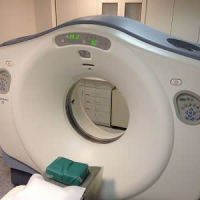A new study published in the journal Thorax adds to evidence suggesting that integrating CT lung cancer screening with evidence-based smoking cessation interventions could prompt quitting in motivated high-risk smokers.
Smoking cessation was examined among a subset of current smokers who were high-risk participants in the UK Lung Cancer Screening (UKLS) pilot trial of low-dose CT screening. The findings show that CT screening offers a teachable moment for smoking cessation, especially among those who receive a positive scan result.
In the study, high-risk individuals aged 50-75 years who completed baseline questionnaires were randomised to CT screening (intervention) or usual care (no screening control). Smoking habit was determined at baseline using self-report. Smokers were asked whether they had quit smoking since joining UKLS at short-term follow-up (two weeks after baseline scan results or control assignment) and longer-term follow-up (up to two years after recruitment). Intention to treat (ITT) regression analyses were undertaken, adjusting for baseline lung cancer distress, trial site and sociodemographic variables.
Of 4,055 participants, 1,546 were baseline smokers (787 control, 759 intervention). Smoking cessation rates were 5% (control n=36/786) versus 10% (intervention n=75/758) at two weeks and 10% (control n=79/775) versus 15% (intervention n=115/749) at up to two years follow-up. In addition, ITT analyses indicated that the odds of quitting among screened participants were significantly higher in the short term and longer term compared with control. Intervention participants who needed additional clinical investigation were more likely to quit in the longer term than the control group.
Smoking is the leading cause of preventable morbidity and premature mortality worldwide. In the UK, an estimated 86% of lung cancer cases are attributable to smoking. The UKLS pilot trial is the first to assess the feasibility, cost-effectiveness and psychosocial impact of lung cancer screening using a single low-dose CT screen versus no screening in a UK high-risk population.
The current study builds on previous UKLS reports by examining the behavioural effects of trial participation and modifying variables on smoking cessation at short-term and long-term follow-up.
"Despite concerns about a negative lung screen offering a ‘license to smoke’, there was no evidence that UKLS screening participants who received an all-clear CT result were less likely to quit. Analysis indicated that a positive CT scan result prompted smoking cessation in the longer term compared with participants who were not screened and participants who received a negative scan, suggesting that a positive lung screening result may provide an additional stimulus for quitting over and above that of screening participation," the study authors write.
Notably, the results mirror the findings of other controlled trials, including the Danish Lung Cancer Screening Trial (DLCST) and the U.S. National Lung Screening Trial (NLST), where smokers with identified abnormalities were more likely to stop smoking than those with normal results, the authors say.
"However, further behavioural research is needed to identify ways of engaging harder to reach smokers, and to robustly test the optimal type and timing of strategies for delivering stop-smoking support to high-risk participants. Successful integration of evidence-based strategies for smoking cessation with stratified lung cancer screening could be a prudent use of limited healthcare resources, translating into major health benefits for all smoking-related diseases," the authors conclude.
Source: Thorax
Image Credit: Pixabay
References:
Brian, Kate et al. (2017) Impact of low-dose CT screening on smoking cessation among high-risk participants in the UK Lung Cancer Screening Trial. Thorax. doi.org/10.1136/thoraxjnl-2016-209690
Latest Articles
CT, CT Lung Cancer Screening, moking cessation interventions, high-risk smokers
A new study published in the journal Thorax adds to evidence suggesting that integrating CT lung cancer screening with evidence-based smoking cessation interventions could prompt quitting in motivated high-risk smokers.



























